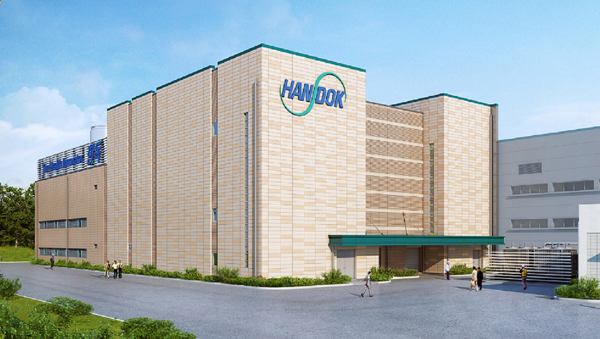Handok Tuesday celebrated the completion of its state-of-the-art “plaster” plant, which will produce the company’s blockbuster patch, the “Ketotop Plaster.”
Ketotop Plaster (ingredient: Ketoprofen) is a patch used to alleviate painful symptoms of rheumatoid arthritis, osteoarthritis, spinal and backbone inflammations, and swollen joints. Handok한독 acquired the treatment by buying Pacific Pharmaceutical’s Pharmaceutical division in 2014.

The company held the commemoration ceremony at the plant in Eumseong, North Chungcheong Province, built with the investment of 30 billion won ($26.3 million). Construction started in June 2015 for the factory, will allow the company to produce Ketotop patches. It gained the Ministry of Food and Drug Safety’s good manufacturing practice (GMP) approval last Monday.
"We have set up a platform to elevate Ketotop to a global brand with the completion of this plaster production plant. Ketotop has been the leader in the percutaneous absorption medication market over the past 20 years,” CEO Kim Young-jin김영진 said. “Now armed with self-producing capability and capacity, Ketotop will cement its dominance in the transdermal drug delivery system market.”
The plant showcases environment-friendly facilities and smart factory infrastructure, the company said. Handok has installed a Regenerative Thermal Oxidizer (RTO) worth 1.2 billion won that reduces air pollutant emissions by completely incinerating volatile organic compounds generated during production.
The plaster production plant, with a total floor area of 7,632 square meters, is also equipped with an international quality management system, capable of producing up to 390 million plasters annually.
The company plans to innovate the Ketotop’s product line at the plant and develop a new inhibitor patch for the global market on top of producing the original plaster.
Ketotop has shown significant growth after Handok’s acquirement of it in 2014, recording a 30 percent sales increase last year compared with 2015 and a 40 percent increase in the first quarter of this year compared with the same period of 2016.
The company also expanded its exports to Singapore, Malaysia, and Vietnam this year, and plans to further diversify its export destinations to other Asian countries as part of its efforts to make the product a global brand, company officials said.

